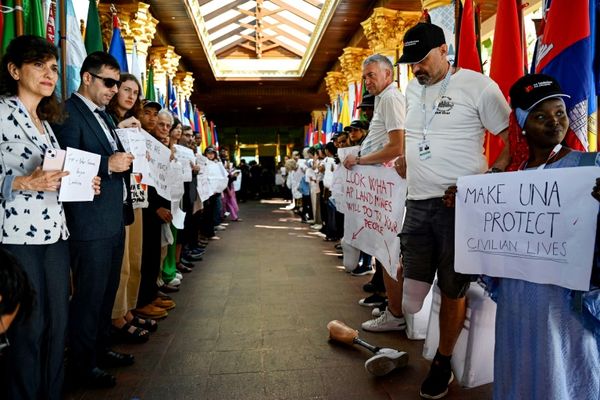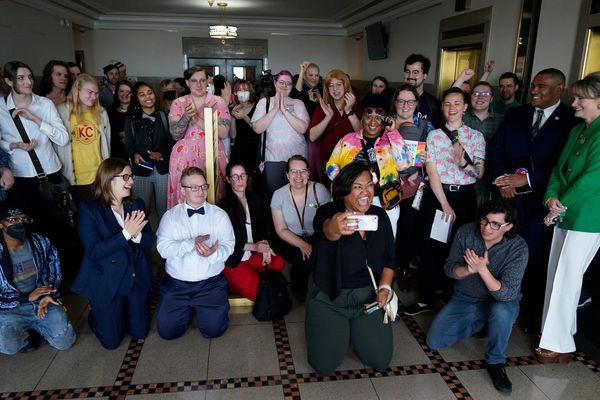
Diplomats and politicians across the political spectrum in the United States have been heralding the once-in-a-generation opportunity to see Sudan transformed from pariah to partner. But in an only-in-Washington storyline, these seemingly well-intentioned allies could well be pushing Sudan’s democratic experiment to the breaking point as they negotiate the terms for one of the biggest obstacles to the country’s future success and its relationship with Washington—being removed from the U.S. State Sponsors of Terrorism list.
An immensely complicated and highly political process in all circumstances, with few historical precedents to follow, being removed from the list has been Sudan’s biggest request of Washington since last year’s civilian protests led to the overthrow of Omar al-Bashir, the autocratic leader who landed Sudan on the list 27 years ago by sheltering Osama bin Laden while al Qaeda planned terrorist attacks on U.S. embassies in East Africa and the USS Cole. Relatives of the victims have long demanded justice from the Sudanese government.
Washington has seen Sudan’s request as its biggest point of leverage in ensuring the country aggressively pursues a set of political and economic reforms that would cement its place as one of the few democratic successes coming out of the Arab Spring tumult of the last decade. As the two countries approach a deal that could see Sudan delisted once and for all, Washington is testing the limits of what more it can get beyond a stable, democratic partner in an unstable region.
Looking well beyond Sudan’s strategic position in the Horn of Africa astride the Sahel and the Red Sea, the U.S. State Department has developed visions of Sudan as another Arab pearl in a necklace of Middle East peace it is stringing together before Election Day.
The administration staffers leading these efforts offer a clue: The State Department’s outgoing Iran envoy, Brian Hook, accompanied Secretary of State Mike Pompeo on his tour of Khartoum last month, and the White House senior director for the Middle East, Miguel Correa, who helped broker the Emirati-Israeli rapprochement, reprised that role again this week in secret talks with Sudan and the United Arab Emirates. That seemingly small bureaucratic shift away from the Africa bureau, where Sudan has resided and which understands the country’s tumultuous history with the United States, however, underscores an at-all-costs approach to signing another Arab peace deal for the administration’s most prized diplomatic ally, Israel.
The United States and Israel see a match made in heaven in the rapprochement. Sudan’s civilian leaders have also repeatedly emphasized their intention to establish a “balanced foreign policy” and deepen their relations with established democracies. Viewed from Washington, what better example of both and demonstration that Sudan truly belongs off the terrorism list than normalizing relations with the Middle East’s only true democracy?
For Israelis, diplomatic ties with Sudan open the channels for intelligence sharing and give them a window into the opaque world of Sudanese counterterrorism efforts. As few as 10 years ago, Israeli Air Force jets were bombing smuggling routes across Sudan’s vast northern desert region, where well-established networks have for years ferried weapons up the Red Sea and into Gaza in support of Palestinian militants. Ties to Khartoum would help cut that lifeline and build Israeli Prime Minister Benjamin Netanyahu’s diplomatic wall around the Palestinians even higher.
But what started out as a blind date of sorts between Netanyahu and Sudan’s de facto head of state, Gen. Abdel Fattah al-Burhan, in February has taken on the contours of an arranged marriage seven months later. The hoped-for wedding was disrupted by disputes over the dowry this week when the U.S. offer of as much as $500 million in unspecified “aid and investment,” Israel’s pledge of $10 million in direct budgetary support, and the UAE’s promised $600 million in fuel trade deals weren’t enough to earn Sudan’s final blessing, according to officials who participated in the talks.
In the throes of an economic meltdown inherited by its corrupt and kleptocratic predecessor, and aggravated by the COVID-19 pandemic and the effects of a historic flood, Sudan’s government needs cash to prop up its decimated currency, slow the pace of spiraling hyperinflation, and import basic commodities like food and medicine for it short-term survival.
An IOU simply cannot be monetized in time to sell this deal with Israel to an ambivalent Sudanese public, which despite some opposition from left-leaning politicians and die-hard Islamists is mostly seen as a sideshow by the bulk of Sudan’s citizens. With living standards cut by more than half over the last year and the government trumpeting a family assistance program that will distribute a mere $5 per month to those in greatest need, any effort by their government that doesn’t put money in the bank or food on the table feels a bit like wasted energy. If the dowry offered to Sudan this week had been larger and more immediate, the diplomatic vows could well have been consecrated.
Still, all hope is not lost for the Sudanese. Despite a last-ditch effort to get something for nothing, many in Washington appear to understand that allowing Sudan to retain the terrorism label will choke off the country from the outside investment it needs to avoid slipping into failed state status. An even more powerful motivator than achieving Middle East peace is avoiding state failure in Sudan, something Washington has no wish to be blamed for—and which is likely if Sudan stays on the terrorism list.
Not to be outdone by the State Department’s attempts to extract even more benefit from the terrorism delisting, Congress, at the same time, has become locked in its own standoff—completely uncoordinated with administration efforts—over the terms of Sudan’s legal peace legislation. The details of that deal will determine whether, even after being removed from the terrorism list, Sudan will continue to have the long shadow of its past cast over it and begin the long road toward economic recovery.
Without legal peace, the families of victims from the U.S. embassy bombings in East Africa in the 1990s, with enforceable legal judgments against Sudan, will soon be empowered to deny Sudan access to U.S. capital markets, pursue any asset of Sudan found in the United States, and impede potential business deals through a discovery and subpoena process—effectively dampening any potential U.S. investments in the country and negating many of the curative effects of being removed from the terrorism list.
Adding to the list of aggrieved is a rump group of victims of the 9/11 terrorist attacks who, while holding no legal judgments against Sudan, have blanketed Congress with a powerful and compelling narrative that if Sudan bears responsibility for the U.S. embassy and USS Cole bombings, then it likely bears some responsibility for 9/11, too. A recent court action on their part seeks to uncover a secret “Sudan dossier” inside Khartoum’s once powerful intelligence apparatus that they hope reveals a smoking gun of culpability.
Backing this effort with a sympathetic ear, and the political muscle to block any deal on legal peace, are powerful Democratic Sens. Chuck Schumer and Robert Menendez, both of whom bear the added responsibility of representing this powerful 9/11 constituency in Congress. It is impossible to imagine that either would allow Sudan to escape with blanket immunity without first ensuring that their constituents had their day in court and ultimately enjoyed an equitable settlement from Sudan on par with other victim groups.
Recognizing this, a least bad outcome for the Sudanese has begun to emerge that would grant Sudan its legal peace now for those terrorism cases in which it has reached financial settlement but would hold open the door to new 9/11 prosecutions and settlement payments for potentially years to come. While not the clean break with the past it had hoped for, as Sudan will continue to bear some of the ill effects of the label even after it is removed from the list, the deal would clear a path for the World Bank and International Monetary Fund to extend an immediate economic lifeline to the country, something it desperately needs to stave off financial collapse.
The question that remains is whether this deal can be sold to the Sudanese people, who died for their own chance at democracy and who today suffer from the benign neglect of well-intentioned friends who claim, without the slightest hint of irony, to want nothing more than to see Sudan’s transition succeed. The best way to demonstrate that commitment is to put forth a deal that recognizes Sudan’s efforts to change and offers its people a path forward to survive and prosper.






